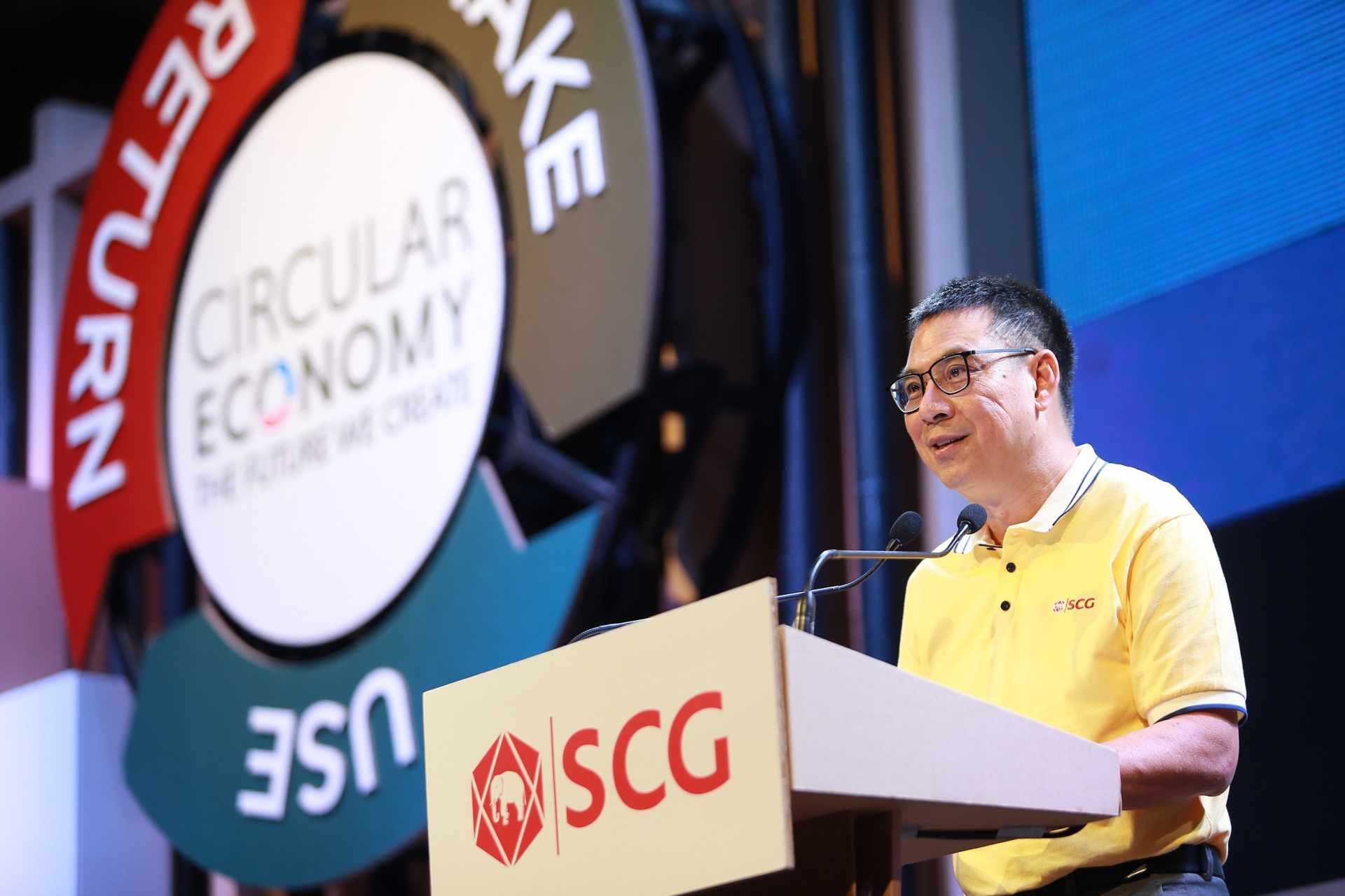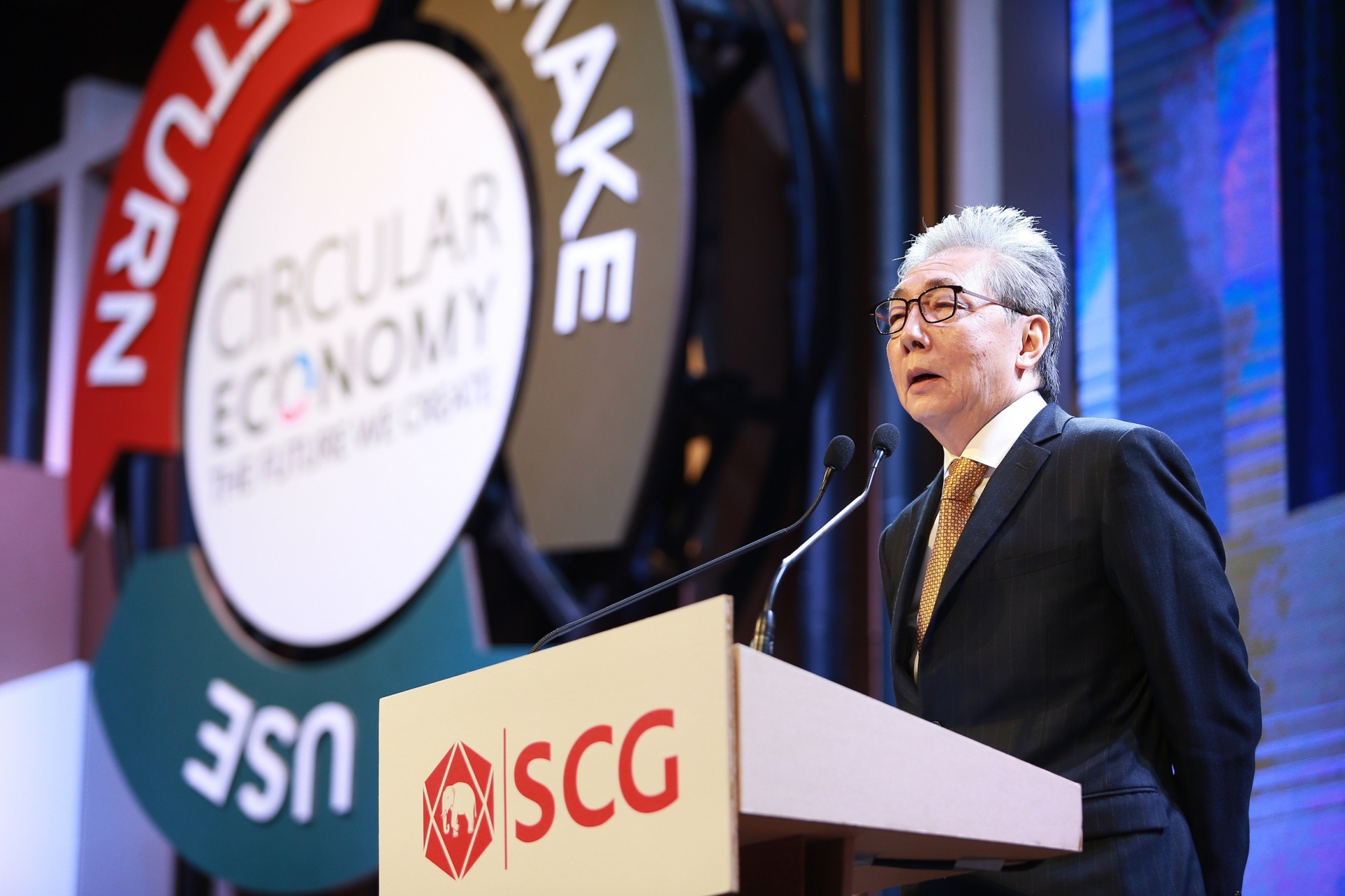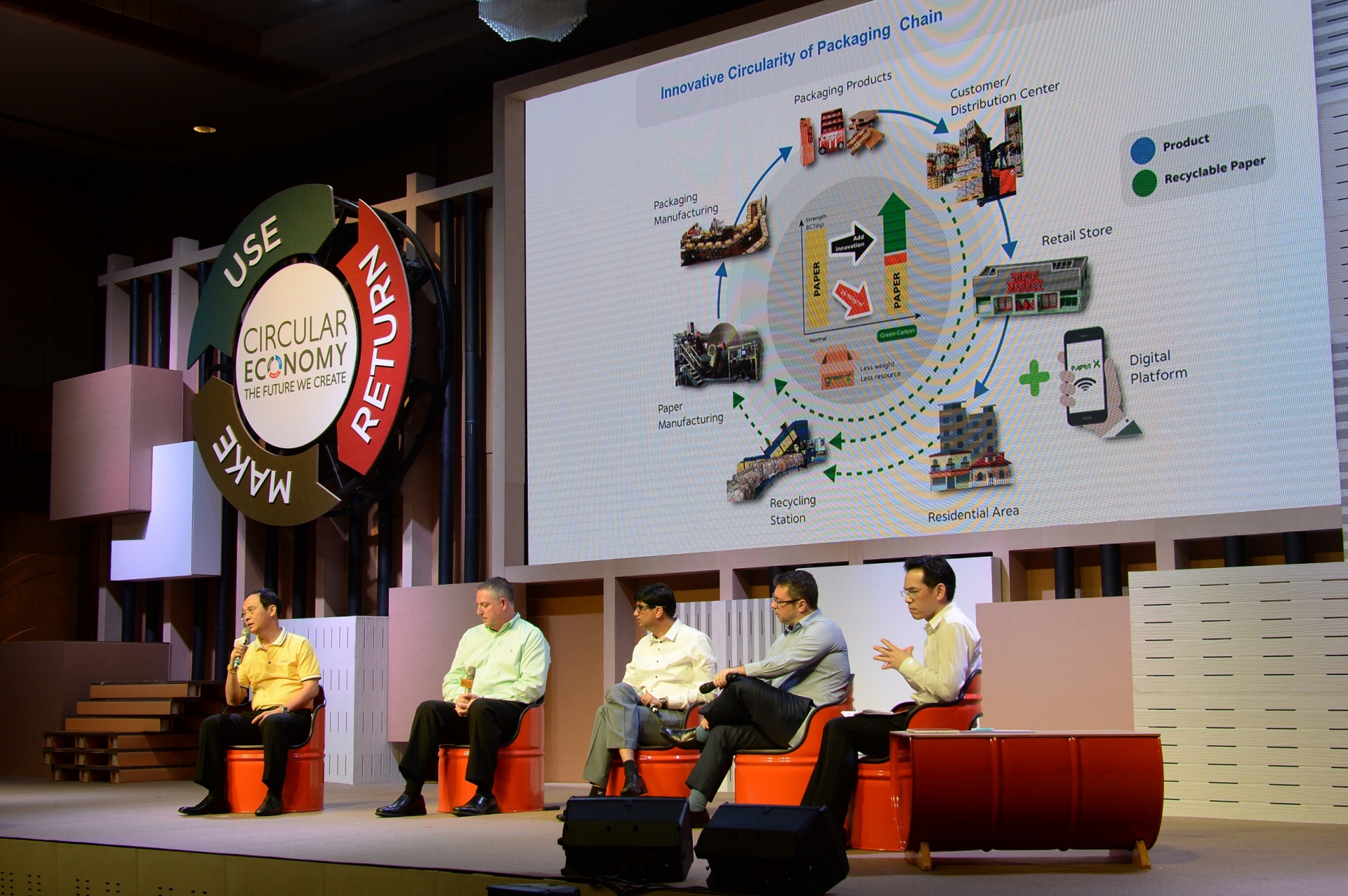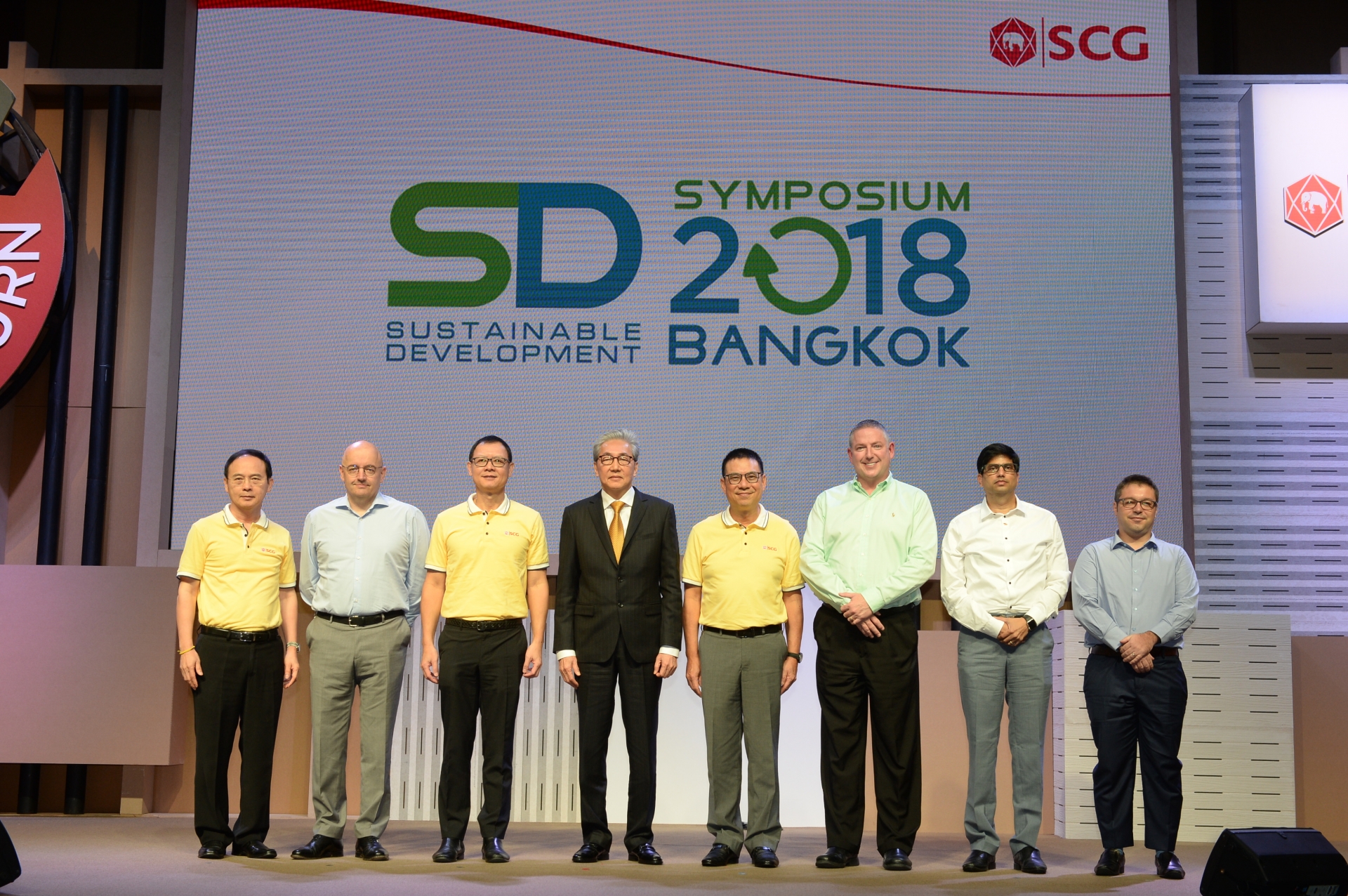SCG heads for circular economy by success stories
 |
| Roongrote Rangsiyopash, President and CEO of SCG made a speech at a global forum on Sustainability Development in Thailand on July 9 |
Under the concept "Circular Economy: The future we create," the conference attracted included leading global companies as well as representatives from the government sector, civil society, SMEs, startups, as well as local communities.
Participants have exchanged perspectives and share success stories to collaboratively drive the circular economy by promoting an efficient use of natural resources throughout the value chain, which includes manufacturing, consumption, and recovery processes. This concept will enhance the sustainability of businesses, while also improving the quality of life and resulting in global sustainability.
"SD Symposium 2018" was an academic forum on sustainable development. For the past five years, the forum's objective is to develop broader awareness about sustainable development goals. This year, the forum focused on a circular economy and will feature a keynote speechby Dr Somkid Jatusripitak, Deputy Prime Minister of Thailand.
According to Dr. Somkid Jatusripitak, Deputy Prime Minister of Thailand, the Thai government's vision is to drive a circular economy in order to promote sustainable growth for Thailand.
The President and CEO of World Business Council for Sustainable Development (WBCSD) also gave a presentation on a circular economy in the global context.
Several seminars were also held to disseminate success stories about the circular economy in all sectors, inviting participants to adopt the shared knowledge effectively.
According to Jatusripitak, the circular economy concept is very much in line with the Thai government's strategy to drive the Thai economy, especially by focusing on value-driven products and services.
“The Thai government has followed the roadmap to promote sustainable economic growth amidst global challenges on natural resources. Hence, the 20-year National Strategy also focuses on environmentally friendly development as well as a balance between natural resources conservation and usage. This has been supported by other measures, including the promotion of innovation and digital economy to encourage the sharing and efficient utilisation of resources, appropriate and efficient waste management through reusing and recycling, as well as ethically, socially, and environmentally responsible business practices,” he said.
However, the successful implementation of the circular economy concept would not be possible with the government's support alone, theprivate sector must also participate.
Roongrote Rangsiyopash, President and CEO of SCG, explained that the circular economy concept could help solve the problems of dwindling natural resources, as it workes differently from the traditional linear economy model (Take-Make-Dispose) by preserving natural resources and using them in the most efficient way.
“By creating systems in which waste could re-enter the supply chain, a circular economy could lead to environmental and social sustainability,” said Rangsiyopash.
SCG, as part of the business sector, vowed to be one of the key driving forces to initiate collaboration with other parties.
The SD Symposium 2018 gathered thought leaders and representatives from leading organisations to showcase their stories of successful implementation of the circular economy concept. The goal was for participants to get new perspectives that could solve global problems and would inspire them to adopt the circular economy concept to make it happen.
Peter Bakker, president and CEO of World Business Council for Sustainable Development, added that the circular economy concept is an innovative and revolutionary concept that defies traditional manufacturing and consumption behaviours.
“It allows the global economic system to be the most efficient use of natural resources. In order to spread this concept in the business community, we must start with instilling a conscience within the management and employees to head towards the same goal. At the same time, all sectors must also be concerned about the problems and come together to change our world,” said Bakker.
ASEAN is a relatively challenging region, as it is still in the process of driving developments, uplifting the quality of living, and acting as a key manufacturing hub catering to the world’s continuously increasing demand.
This results in the shortages of resources. The successful implementation of the circular economy concept can help promote the manufacturing of products and services using innovation that helps to maximise the efficiency of the use of resources. This effectively helps to reduce corporations’ operation costs from the use of resources, thereby increasing their competitive edge, which could bring about growth opportunities on the global level, worth $4.5 trillion by 2030 (source: CEO Guide to the Circular Economy, WBCSD).
In addition, the circular economy can also help to reduce carbon emissions, leading to improved living conditions around the world and realising the Paris Agreement as well as the United Nations’ Sustainable Development Goals.
 |
| Dr Somkid Jatusripitak, Deputy Prime Minister of Thailand, stressed the importance of a circular economy |
 |
| Over the course of the Q&A, the panel discussed how to implement the circular economy |
 |
| The SD Symposium 2018 gathered thought leaders and representatives from leading organisations |
What the stars mean:
★ Poor ★ ★ Promising ★★★ Good ★★★★ Very good ★★★★★ Exceptional
Related Contents
Latest News
More News
- Vingroup consults on carbon credits for electric vehicle charging network (January 28, 2026 | 11:04)
- Bac Ai Pumped Storage Hydropower Plant to enter peak construction phase (January 27, 2026 | 08:00)
- ASEAN could scale up sustainable aviation fuel by 2050 (January 24, 2026 | 10:19)
- 64,000 hectares of sea allocated for offshore wind surveys (January 22, 2026 | 20:23)
- EVN secures financing for Quang Trach II LNG power plant (January 17, 2026 | 15:55)
- PC1 teams up with DENZAI on regional wind projects (January 16, 2026 | 21:18)
- Innovation and ESG practices drive green transition in the digital era (January 16, 2026 | 16:51)
- Bac Ai hydropower works stay on track despite holiday period (January 16, 2026 | 16:19)
- Fugro extends MoU with PTSC G&S to support offshore wind growth (January 14, 2026 | 15:59)
- Pacifico Energy starts commercial operations at Sunpro Wind Farm in Mekong Delta (January 12, 2026 | 14:01)

 Tag:
Tag:




















 Mobile Version
Mobile Version